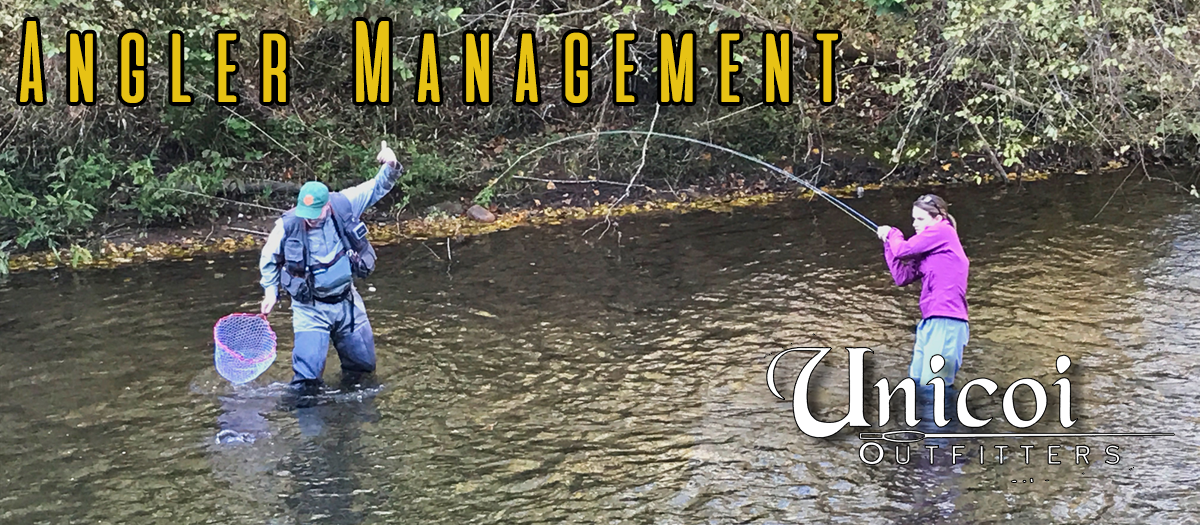With all the rain we've experienced over the past couple of weeks, we thought we would ask Landon Williams to be our guest blogger and help you understand how we continue to catch fish even under adverse water conditions.
How to Deal With the “Rise” and “Fall” of Winter Weather
Landon Williams
The monsoon of last week may be
over but our rivers and streams are just now starting to get back to
recognizable flows. Fishing when the water is lower is always less demanding
physically but when it’s high from events such as the recent rain, conditions
can not only be unfavorable for the fishing but also dangerous with the raging
water and decreased visibility. However, there are the periods of rising and
falling water that provide very challenging and sometimes even rewarding
fishing conditions in themselves.
 |
| Raging Dukes Creek - The Swimming Hole |
 The “rise” occurs when water levels
begin to come up in our streams when a heavy rain period occurs. Rises are very interesting fishing-wise
as conditions generally become more dangerous for the fisherman as time
continues and water levels rise. At the same time, they also provide a
wonderful fishing opportunity if you can time the period right. Fish that have
often been restricted of movement during low flows often move out of the deeper
slow pools into the runs and riffles to feed on dislodged food items from both
below and above the water’s surface. Below the surface, increased flows often
knock mayfly, caddis, and stonefly nymphs from the stream bottom and into the
drift, easy pickings for a hungry trout. As water levels continue to rise due
to rain, the soil alongside the streams often become saturated enough for perhaps
the highlight of the event, the worms! If you are fishing in higher water,
check the parking area wherever you are fishing. If you see our long tubular
friends, then there is often a chance that the trout are also seeing them and
actively feeding on them as well. This is your big hint on perhaps what you
should be fishing that day (hint: San Juan worm varying with the color of the
stream. Go brighter with your fly selection the dirtier the water gets).
The “rise” occurs when water levels
begin to come up in our streams when a heavy rain period occurs. Rises are very interesting fishing-wise
as conditions generally become more dangerous for the fisherman as time
continues and water levels rise. At the same time, they also provide a
wonderful fishing opportunity if you can time the period right. Fish that have
often been restricted of movement during low flows often move out of the deeper
slow pools into the runs and riffles to feed on dislodged food items from both
below and above the water’s surface. Below the surface, increased flows often
knock mayfly, caddis, and stonefly nymphs from the stream bottom and into the
drift, easy pickings for a hungry trout. As water levels continue to rise due
to rain, the soil alongside the streams often become saturated enough for perhaps
the highlight of the event, the worms! If you are fishing in higher water,
check the parking area wherever you are fishing. If you see our long tubular
friends, then there is often a chance that the trout are also seeing them and
actively feeding on them as well. This is your big hint on perhaps what you
should be fishing that day (hint: San Juan worm varying with the color of the
stream. Go brighter with your fly selection the dirtier the water gets).  |
| Dukes Creek Bow in High Water |
 |
| Finding the High Water Refuge |
More importantly, keep yourself safe when wading this time
of year. Wear a wading belt, use a staff, and fish with a buddy if possible.
Also keep an extra pair of warm clothes at hand in case of a dunking. Perhaps
most importantly, have a camera… Just in case!






.jpg)


